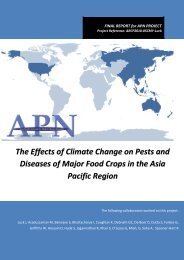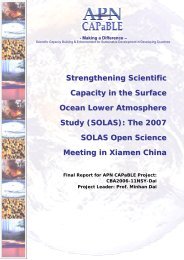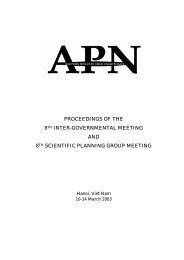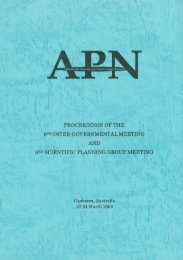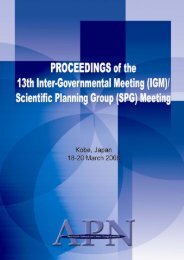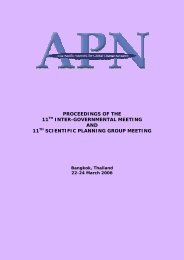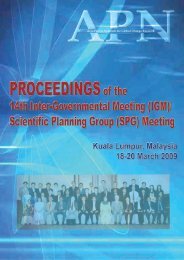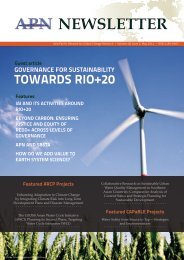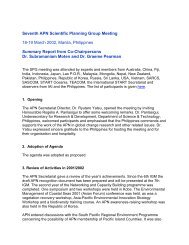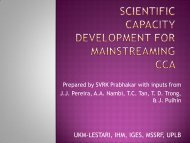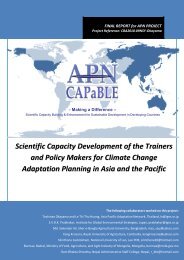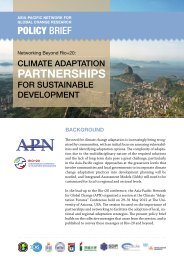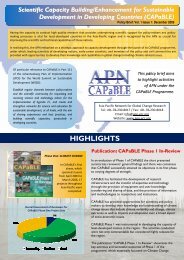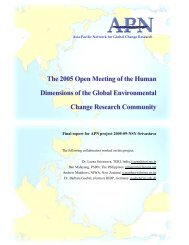2005-IGM-SPG 10.pdf - Asia-Pacific Network for Global Change ...
2005-IGM-SPG 10.pdf - Asia-Pacific Network for Global Change ...
2005-IGM-SPG 10.pdf - Asia-Pacific Network for Global Change ...
You also want an ePaper? Increase the reach of your titles
YUMPU automatically turns print PDFs into web optimized ePapers that Google loves.
�61�<br />
<strong>IGM</strong>/10/10<br />
<strong>SPG</strong>/10/10<br />
15-26 June, 2004. (APN CAPaBLE Programme) <strong>Pacific</strong> Island Training<br />
Institute on Climate and Extreme Events<br />
This joint training institute was convened by USP’s <strong>Pacific</strong> Centre <strong>for</strong> Environment<br />
and Sustainable Development (PACE-SD), the East-West Center (EWC), Hawaii, and<br />
the National Institute of Water and Atmospheric Research (NIWA), New Zealand, at<br />
the USP campus, Suva. The training institute was coodinated by Prof. Koshy, Ms.<br />
Eileen O’Shea (EWC) and Dr. Jim Salinger (NIWA). The APN’s CAPaBLE programme,<br />
and the U.S. National Oceanic and Atmospheric Administration were the major<br />
sponsors with additional contributions from USP, EWC and NIWA. Small Islands<br />
Developing States (SIDS), such as those in the <strong>Pacific</strong> region, are considered among<br />
the most vulnerable to the consequences of climate variability and change and<br />
associated extreme weather events. The training institute is expected to assist in the<br />
development of a regional network of scientists, <strong>for</strong>ecasters, disaster management<br />
officials and resource managers, skilled in the development and the use of climate<br />
in<strong>for</strong>mation to increase the resilience of <strong>Pacific</strong> Island nations in the face of climaterelated<br />
extreme events. The institute was comprised of an intensive programme of<br />
lectures, small group discussions, training sessions, in a computer lab, and<br />
collaborative research activities. About 35 participants, including resource people,<br />
participated in the Training. Mosmi Bhim also participated in this training.<br />
28-30 June 2004. <strong>Pacific</strong> Regional Stakeholders Planning Workshop<br />
The South <strong>Pacific</strong> Applied Geoscience Commission (SOPAC) hosted the Regional<br />
Stakeholders Planning Workshop to develop a <strong>Pacific</strong> Regional Strategic Disaster<br />
Risk Reduction Action Plan, to assist the <strong>Pacific</strong> Island region’s preparations <strong>for</strong> the<br />
2 nd World Conference on Disaster Reduction which was held in Kobe, Japan,18-22<br />
January, <strong>2005</strong>. To ensure that the interests of the <strong>Pacific</strong> region were represented in<br />
Kobe, over 40 participants representing 16 countries, as well as regional and<br />
national organisations, attended the regional planning workshop. The workshop was<br />
designed to provide a plat<strong>for</strong>m through which participants could contribute ideas<br />
towards regional policies that would support disaster risk reduction decision-making;<br />
to reduce the vulnerability of the <strong>Pacific</strong> Small Island Developing States (SIDS) and<br />
strengthen their national sustainable development planning. Ms. Mosmi Bhim<br />
attended this meeting and gave a presentation on APN and START activities in the<br />
region related to the workshop theme.<br />
1-3 July 2004. South <strong>Pacific</strong> Tsunami Awareness Workshop Forum<br />
Secretariat. Suva, Fiji<br />
The workshop was organised by the South <strong>Pacific</strong> Applied Geosciences Commission<br />
(SOPAC), the International Tsunami In<strong>for</strong>mation Centre and the Intergovernmental<br />
Oceanographic Commission. Following the presentations, group sessions were held<br />
to prepare a draft document titled ‘Strategic Recommendations <strong>for</strong> Addressing<br />
Tsunami Risks’. SOPAC is expected to consider these recommendations in relation to<br />
the development of the <strong>Pacific</strong> Regional Strategic Action Plan <strong>for</strong> Disaster Reduction.<br />
Presentations were made by experts and country reports were also presented by the<br />
National Disaster Management Officers (NDMO), of various countries. At the end of<br />
this workshop, a Draft Strategic Recommendation <strong>for</strong> Addressing Tsunami Risks was<br />
prepared. This draft document set out a framework whereby <strong>Pacific</strong> countries’<br />
capacity could be enhanced to aid tsunami risk identification, preparedness and<br />
reduction. Ms. Mosmi Bhim, the APN liaison officer, attended this workshop.<br />
8-10 November 2004. The 2nd APN <strong>Global</strong> <strong>Change</strong> Coastal Zone<br />
Management Synthesis Workshop. Kobe, Japan<br />
This project is led by Prof. Nick Harvey of the University of Adelaide, Australia. Prof.<br />
Harvey is also the Chair of the START-Oceania Regional Committee. Prof. Kanayathu



